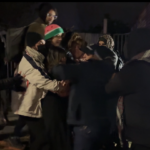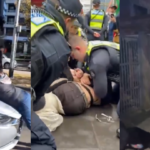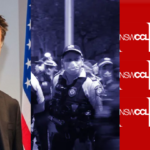NSW Police Assaulted Hannah Thomas Then “Reversed Engineered” Charge to Frame Her as Rioter

The grievous assault some NSW police officers perpetrated on former Greens candidate Hannah Thomas on 27 June 2025 was a step too far, according to a majority of NSW. So, the fact it’s now come to light that NSW police, prior to calling a critical incident, tried to charge her under rioting powers that need special authorisation, makes it abundantly clear that those laying them agreed with that summation.
Thomas suffered a severe injury to her right eye. She currently has to undergo further surgery this week, and she’s been warned that she may never see out of that eye again, apparently because an officer thought it wise to trip her up after he and another officer had illegitimately lunged upon her, and a scuffle with protesters ensued, of which they dragged Hannah out, and then assaulted her.
The Herald revealed on Monday, 7 July 2025 that, despite the fact that the other four arrestees who evidently failed to comply with a move-on direction, those laying the charges decided that Thomas, who was acting as a legal observer at the protest on Bidjigal land in the Sydney suburb of Belmore, should be charged using extraordinary powers to align with her extraordinary injury.
So, the situation that already involved what is the routine laying of criminal offences against a civilian by the NSW Police Force after some of its officers assaulted the individual, shifted to not only did the cops charge Thomas with failing to follow a direction that many of the protesters considered had been questionably issued, but they’d heightened the charge to frame her as a public threat.
But never fear, as later on 7 July 2025, following this strange anomaly in charges being exposed to the public, NSW police assistant commissioner Brett McFadden coincidentally announced that, after a normal protocol review of the charge sheet regarding the assault because it is now deemed a critical incident, the agency has dropped the riot power charge and the regular offence was laid instead.
“Reverse engineering evidence”
“The appearance of these emergency powers on the arrest documents for Hannah Thomas is very revealing and deeply concerning, considering that an assistant commissioner or above must have authorised their use and that they must have believed that a large-scale public disorder was about to take place,” outlined NSW Greens MLC Sue Higginson in a 7 July 2025 statement.
“The other possibility for these emergency powers to be mentioned, is that the NSW police are currently engaging in reverse engineering evidence to justify the assault of an innocent member of the community – something that we call corrupt,” the lawyer added, as she provided a more reasonable explanation as to why a legal observer at a small rally was suddenly considered a rioter.
Thomas was charged with failing to follow a direction under part 6A of the Law Enforcement (Powers and Responsibilities) Act 2002 (NSW) (the LEPRA), which was passed during an emergency sitting of NSW parliament during the 2005 Cronulla Riots: a large-scale public disorder that involved racist Anglo Australians on Dharawal land in the Shire beating on anyone of “Middle Eastern appearance”.
NSW Police News outlined on 30 June that the assault on Thomas had been deemed a critical incident, and it added that she’d been charged with “failing to comply with the direction”, which one would assume to be failing to comply with a direction, contrary to section 199 of the LEPRA, which is an offence that carries a maximum penalty of a $220 fine.
Yet, for some unknown reason, Hannah was charged with refuse or fail to comply with a direction given in accordance with this section, contrary to section 87MA(4) of the LEPRA. This section sits within part 6A, and it carries a fine of $5,500.
So, not only does police partially blinding a legal observer warrant them being framed as a public threat, but they too have to pay through the nose.
“At no point over the last 10 days have any of the police, the premier or the minister for police referred to public disorder – let alone large-scale public disorder,” Higginson underscored.
“What we have seen instead, is a series of statements from the premier Chris Minns and assistant commissioner Brett McFadden that are inconsistent with the evidence from the day, evidence clearly shows police officers acting above the law.”
Reading the riot act
Passed on 15 December 2005, during an emergency sitting of parliament called by the Iemma government, the Law Enforcement Legislation Amendment (Public Safety) Act 2005 (NSW), contained extreme powers that amended a number of Acts, including inserting part 6A into the LEPRA, due to white Australians disapproving of “foreigners” hanging out at “their beach”.
The emergency powers inserted into the LEPRA were placed on the books to deal with cases of large-scale public disorder. Public disorder is defined as “a riot or other civil disturbance that gives rise to a serious risk to public safety”, and the NSW police commissioner or a deputy or an assistant commissioner must authorise the use of these powers, which have never been used since 2005.
The only other time that the NSW police has considered permitting their use was in October 2023, to police a Hyde Park pro-Palestinian protest, following the antisemitic slur demonstration incident at the Sydney Opera House days prior. And at that point in time, NSW police deputy commissioner David Hudson made a public announcement that this might occur. Yet it didn’t happen.
So, it is rather doubtful that NSW police invoked these “special powers to prevent or control public disorder in a public place” at the early morning protest outside the SEC Plating premises in Belmore, as it was a fairly lowkey event.
The demonstration was against Israel’s Gaza genocide, as protesters claim SEC provides plating for the F-35 fighter jets used in Gaza, although the company denies this.
And the image this scenario conjures is that of two NSW police officers flipping through all the law enforcement legislation back at the station, looking for an excuse as to why they’d put a legal observer in hospital, over her having questioned the authority to issue a move-on order, as were many protesters, due to the stipulations involved in issuing a move-on order set out in the LEPRA.
In a time of genocide
On being questioned about the suspect charge against Thomas’ name on Monday, NSW premier Chris Minns said, “I’m concerned that I would be accused of interfering or offering a commentary before it’s been completed and presented to both police and the government, and I want to make sure that it can be done independent from me.”
But he wasn’t really showing too much concern for Thomas, who told the Herald that the brutalisation that she has endured has strengthened her resolve to keep protesting the Gaza genocide, and she defended the right of protesters to not make it easy for the authorities to shut down such direct actions, especially with the ongoing mass murder of Palestinians by Israel.
Some commentators raise the point that the excessive force used against Thomas is not the first incident of police violence towards civilians, but this doesn’t mean the constituency should roll over and play dead, as there appears to be a distinct rise in the force that law enforcement is prepared to apply to pro-Palestinian and antigenocide protesters at present, and this seems to be increasing.
“There was no evidence whatsoever to form the basis to invoke the extraordinary police community control powers, the event was intended and was in fact, a small lawful gathering of people protesting about SEC Plating and the genocide taking place in Gaza,” Higginson made clear on Monday.
“The LECC is responsible for investigating complaints of misconduct against police officers, and that’s why I have written to the commissioner of the LECC today, making a complaint to them that certain police officers have engaged in serious misconduct in relation to these arrests,” concluded the NSW Greens justice spokesperson.







